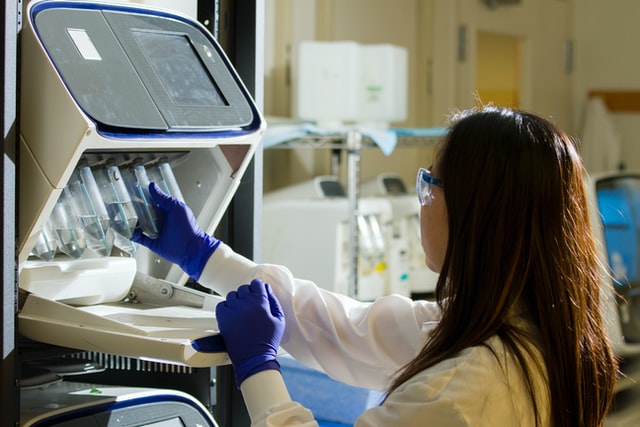
Drug-gene testing may be the answer to getting patients DNA-compatible medications. Photo by the National Cancer Institute on Unsplash.
Understanding drugs and your DNA…
Did you know that a DNA sample can tell you how you’ll respond to certain drugs? A new and increasingly popular practice called pharmacogenomic testing, or drug-gene testing, makes it possible to sequence a patient’s DNA and determine which medications will work with their body… and which won’t.
For example, people with red hair will often need more anesthesia when they go under the knife. Without the additional medicine, they’ll feel every stab and cut and poke a surgeon makes. A mutation in redheads’ MC1R gene is responsible for this strange phenomenon. We wouldn’t know this without pharmacogenomics, which is the study of how our genes influence the ways our bodies break down and absorb drugs.
Are you curious to know how your genes fare? You should talk to your doctor about getting a drug-gene test.
What happens during a drug-gene test?
The test itself is simple. The doctor will either take a small sample of blood or a swab of saliva and/ or cheek cells from the patient and send it away for a laboratory diagnostic. Then, the scientists who receive the sample will use it to look for are genetic variations in the patient’s DNA that complicate or nullify the effects of common drugs. When the results are in, the patient will be given a list of medications that their bodies can metabolize and a list of medications that their bodies cannot metabolize.
Why is drug-gene testing important?
Taking the time to find out what medications work with the patient’s DNA can help save time, money, and energy on ineffective treatments. Additionally, taking the wrong medications can result in lingering illnesses, unpleasant or debilitating side effects, infection, hospitalization, and even death.
Take this scenario as an example: Gina, a woman in her early thirties, develops depression accompanied by thoughts of suicide. To combat this, she gets in contact with a psychiatrist who recommends putting her on medication. When she meets with the psychiatrist, he does a drug-gene test and sends it away for a diagnostic. A week later, Gina learns from her test results that her body can only effectively metabolize a handful of the hundreds of antidepressants available to her. The rest will not work.
Because Gina knows this, she will be able to start treatment right off the bat without having her depression prolonged or suicidal ideation worsened. She will receive relief quickly. And if all else goes well and she follows through with all her recommended treatments, she will be able to resume her life as usual within a few months.
What Gina’s story demonstrates is the potential for drug-gene testing to guide doctors and their patients’ drug choices in crucial ways. Many cases, like Gina’s, are time-sensitive and would benefit from quick, effective treatment. More information on how drug-gene testing can match patients with the right medicines can be read here.
Is drug-gene testing covered by insurance?
Because pharmacogenomic testing is a relatively new practice, insurance coverage is a complicated issue. In fact, a single test can cost upwards of two or three thousand dollars for underinsured or uninsured patients, no matter their condition. Other insurance companies, such as Medicare, will cover a percentage of the cost, but only after receiving certain documents from the patient’s physician.
How can I help make drug-gene testing more accessible?
- Educate yourself. There are plenty of studies and testimonials available to read online about the benefits of drug-gene testing and how often it is insured. As the study of pharmacogenomics gains traction over the coming years, there will only be more information available to the public about the practice. The more you know and engage in the conversation, the more others will too.
- Express your interest in drug-gene testing to insurance companies through letter-writing, online campaigns, and phone calls. They are businesses, and thus, will gravitate towards profit. If more customers are willing to pay for policies that cover drug-gene tests, they will be offered more frequently to meet the demand.
- Spread the word. Increasing awareness is an important step to helping pharmacogenomic testing more widely available. Most people simply don’t know that drug-gene testing is an option and that it can save money, time, and lives!
Have Health Insurance Questions?
We hope that this information on drug-gene testing is helpful for you.
Insurance is oftentimes overwhelming and we want to shed light on the industry by answering your questions. Comment below and your question may be the topic of our next post!
If you liked this article, share it with your friends!
Empower Brokerage wants to help you find the insurance coverage you need and how to save money getting it. Stay on top of your health and give us a call at (844) 410-1320.
Get affordable health insurance quotes by clicking here.
See our other websites:

